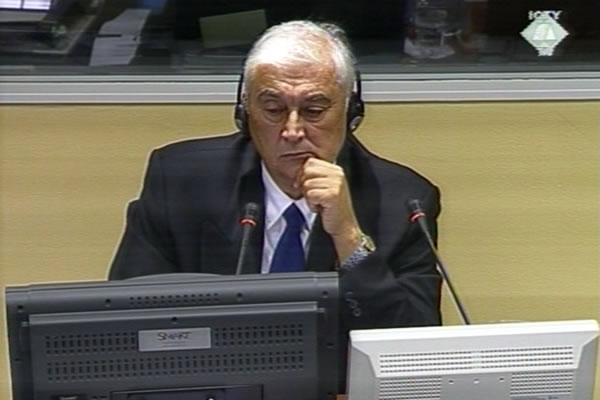Home
‘PEACEMAKER’ JOVICA AND HOSTAGE CRISIS
The UN hostage crisis in 1995 is not alleged in the indictment against Jovica Stanisic and Franko Simatovic. It remains to be seen how much Vlado Dragicevic helped the defense when he testified about it. What is clear from his evidence today as Stanisic’s defense witness is that Dragicevic, former employee of the Serbian State Security Service, qualified as a prosecution witness in the cases against Radovan Karadzic and Ratko Mladic
 Vlado Dragicevic, defence witness of Jovica Stanisic
Vlado Dragicevic, defence witness of Jovica Stanisic The role of the former chief of the Serbian State Security Service Jovica Stanisic in the hostage crisis in BH is one of the rare points in which the prosecution and the defense agree, up to a point. Neither the prosecution nor the defense contests that Stanisic was one of the key persons in the effort to set free the UN hostages captured by the Bosnian Serb forces in the spring of 1995. The defense sees this as proof of Stanisic’s commitment to the peace policy. The prosecution in its case argued that Stanisic’s involvement in the hostage crisis was a strong indicator of the influence Stanisic wielded on the Bosnian Serb leadership.
After a one-month break, Stanisic’s defense continues its case with the evidence of Vlado Dragicevic, former chief of the International Cooperation Department in the Serbian State Security Service. Dragicevic used to be an adviser to the accused, who is a former chief of the Serbian secret service. In May and June 1995, Dragicevic was in the delegation that was sent from Serbia to try and solve the hostage crisis. The witness claims that the accused not only headed the delegation, but had in fact set in motion the whole operation to set the hostages free. Stanisic felt that taking UN staff hostage not only did damage to the Serbs in Bosnia but also affected the Serbs in Serbia. At a moment when ‘no one had the solution’ and when the relations between Belgrade and Pale were already fraught because of Serbia’s sanctions against Republika Srpska, Stanisic suggested to the Serbian interior minister Zoran Sokolovic to embark on a mission to set hostages free, the witness said. According to the witness, only Slobodan Milosevic supported the proposal, although he was ‘skeptical’ about the outcome.
The Serbian delegation held several meetings with the Bosnian Serb political and military leaders. At the meetings, Stanisic tried to make them see ‘the negative aspects’ of their action, the witness explained. Finally, ‘after arduous negotiations’, Stanisic was able to convince them to release the hostages. This was done in the first half of June 1995.The defense showed a TV recording in which RS president Radovan Karadzic says that the officials from Serbia managed to convince his leadership ‘using suggestions rather than pressure and threats’. In another video recording shown by the defense, Stanisic addressed the UNPROFOR staff, promising them safe passage to Serbia from ‘the former Bosnia and Herzegovina’.
According to Dragicevic, the accused met with the Krajina leaders Milan Martic and Milan Babic in the same period. Stanisic told them that the idea to unite the RSK and Republika Srpska was ‘madness sure to lead to disaster’.
Together with his former close associate Franko Simatovic, Jovica Stanisic is charged with the crimes committed by the police and paramilitary units under their control against non-Serbs in Croatia and BH. The hostage crisis is not alleged in the indictment and it remains unclear how much Dragicevic’s testimony will help the accused. However, Dragicevic’s evidence and his statements to the defense admitted into evidence today may be of interest to the prosecution from a different point of view: they might help prove the responsibility of Radovan Karadzic and Ratko Mladic for the hostage crisis. The witness said that the VRS had captured UN staff and ‘placed them as human shields to defend facilities against NATO air strikes’, thus corroborating the allegations in the indictment against Karadzic and Mladic. More importantly, the witness said that his meetings with the Republika Srpska officials led him to believe that ‘Mladic was the sole responsible person’ for the arrest of UNPROFOR staff. A bit later, the witness said that it was done based on ‘a mutual agreement between the military and political leaderships’.
In his evidence, Dragicevic tried hard to present the Serbian State Security Service as a sort of Serbia’s window to the world in the period when the country was isolated politically and economically in the 1990s. As Dragicevic told the judges, the State Security Service had an excellent relationship with a number of secret services in the world: in France, Russia, China, Germany, and in particular in the USA. According to Dragicevic, he had personal contacts with CIA’s resident in Serbia. Dragicevic claimed that in 1993 he took CIA’s Serbian resident to a secret mission to Eastern Bosnia to locate mass graves. As proof of this cooperation, the witness highlighted the visit of a delegation of Serbian intelligence officers headed by Stanisic to the CIA in the summer of 1996.
At the same time, the witness tried to deny there were any ties between the Serbian State Security Service and their opposite numbers from the RSK and Republika Srpska. As the witness said, the Serbian service had a better working relationship with the Americans, the French and the Chinese than with the RSK and Republika Srpska.
Linked Reports
- Case : Stanisic & Simatovic
- 2011-10-13 INDICTMENT IS ABOUT CROATIA AND BH, DEFENSE FOCUSES ON SANDZAK
- 2011-10-12 JOVICA STANISIC WORKED WHEN ON ‘STAND BY’
- 2011-10-11 JOVICA STANISIC WAS ‘SIDELINED’ IN THE SECRET SERVICE
- 2011-11-09 IS COOPERATION WITH CIA DEFENSE AGAINST WAR CRIMES?
- 2011-11-10 DID STANISIC AND MILOSEVIC TRUST EACH OTHER?
- 2011-11-21 AGREEMENT REACHED DURING A BREAK
